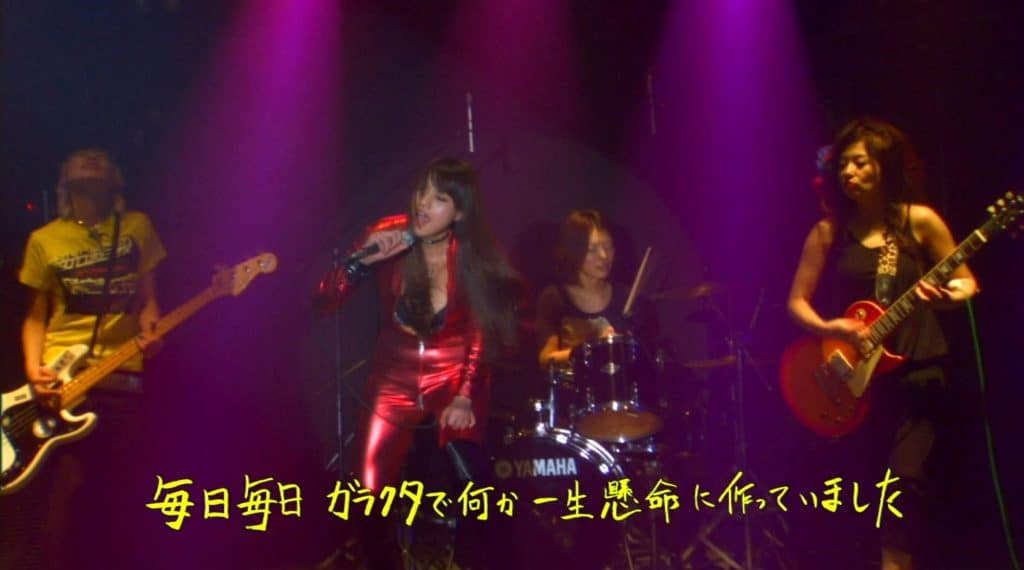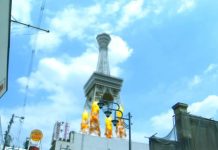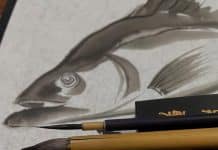Table of Contents
Introduction
Kakuei Shimada is an Osaka movie director known for his energetic, raucous punk rock inspired comedies. While Shimada made at least 10 films in the early years of the millennium, let’s focus here on his two best known films, starting out with Blitzkrieg Bop (2006), known in Japanese as Dengeki BOP no Sexy Motherfuckers ni!!
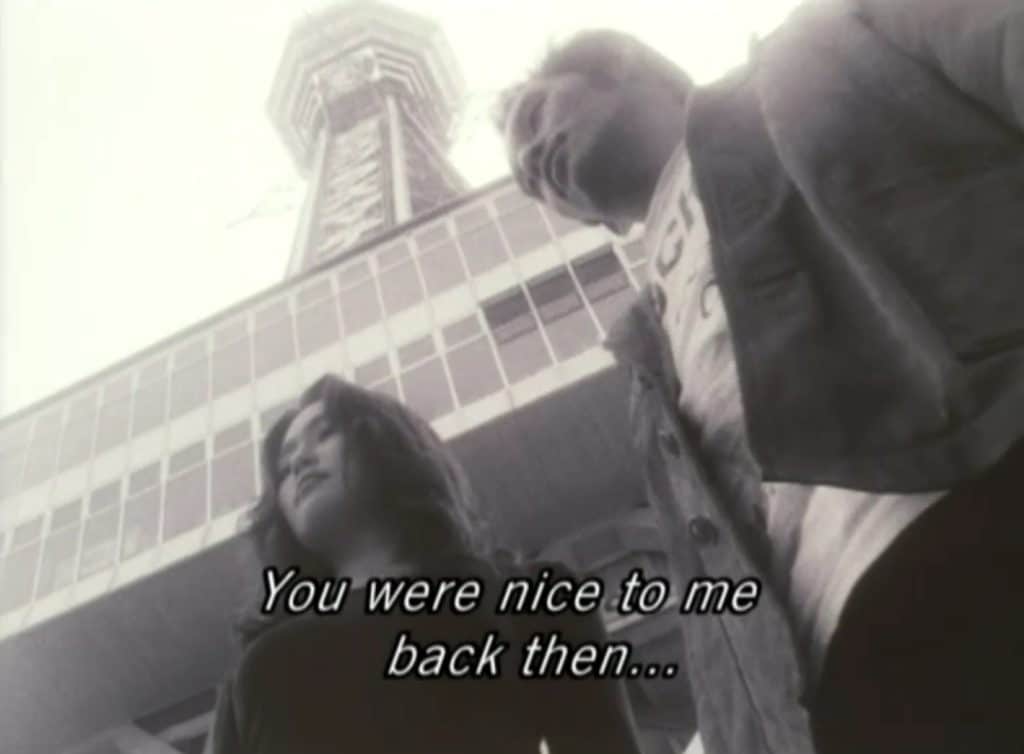
A punk rocker in bloody clothes on the roof of an Osaka highrise. “I jumped from the 5th floor but survived,” he tells the movie audience, “Now, I’m much higher up. Should be high enough.” Without further ado, he steps to the edge of the roof, yells “Rock’n’Roll!” towards the sky and jumps.
On his long way down, he is suddenly joined by a girl flying next to him. “I’m Haruka,” she tells him, “And I want to tell you a story before we both die.” “I want to hear a good story before I die!”, the punk rocker yells.
The story Haruka (Akiko Onishi) relates while both are racing to the ground is the story making up all the two hours of Blitzkrieg Bop.
It starts off with another punk rocker being chased by a “yakuza hunter” with spear in hand, running over the roofs of a long line of parked cars. “I’m not a yakuza!” the punk yells back but his pursuer doesn’t listen.
The spear eventually hits the punk while running along a river bank, close to a small group of people engaging in heavy arguments. Okajima (Masaki Nakai), the main actor of the movie is confronted by Tomoko, his ex-girlfriend. She wants him to rescue her current boyfriend who has been kidnapped by the Fujikita yakuza gang and who is undergoing extreme torture right now.
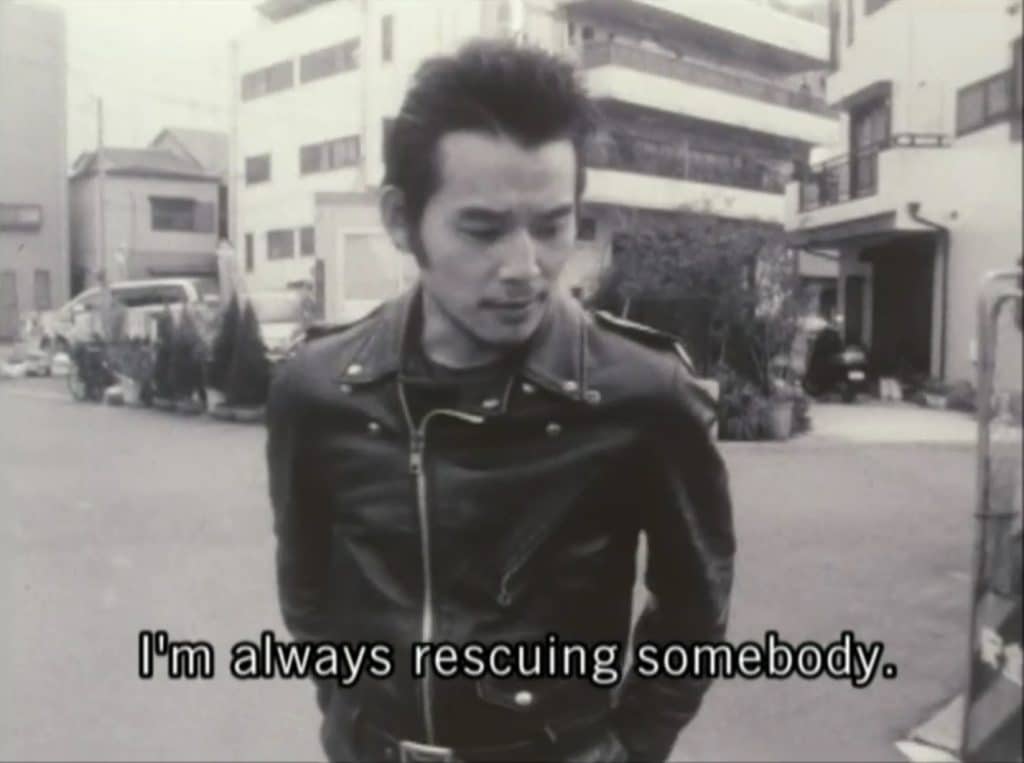
Okajima reluctantly agrees. The moment he does, the punk with a spear through his body gets up and joins him walking, with the spear still sticking out of his front and back.
Blitzkrieg Bop is a comedy. A comedy belonging to the tiny sub-genre of rock’n’roll / punk rock super violent action comedy. Not the first film in this genre and certainly not the last. More on that later.
Okajima starts his way towards the headquarters of the feared Fujikita yakuza gang. On the way, he rescues a very strange girl from being molested by two young thugs. That girl is Haruka, the girl flying towards the ground and starting to tell the story in the opening sequence. The story that we are watching now.
Okajima can’t shake free of Haruka. On their way to the Fujikita gang HQ, they encounter quite a few strange characters who all have to tell their own funny stories.
At one point, they are spotted by Torakichi, an older yakuza hunter who has a special dislike for Okajima and starts to pursue him.
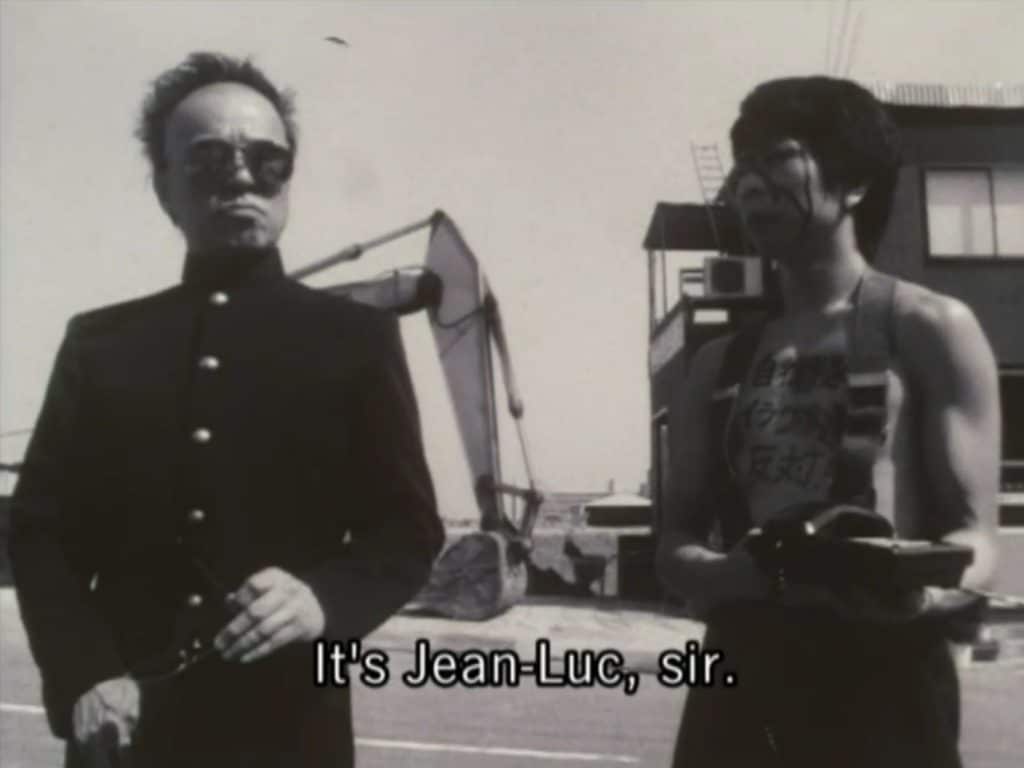
Torakichi (Marie Decaluco) is introduced as a guy who, while “playing ball” with two young yakuza’s heads, bashing them with a baseball bat to teach them morals, receives a phone call from Jean-Luc Godard. “Oh, it’s you, Jean-Luc. The fish are jumping out of the water to see your movies. You should make a kung-fu movie!”
There is not much of a point to describe the plot any further. There is a lot of running, chasing and violence and there are endless jokes to go with all of that.
Blitzkrieg Bop (Japan, 2006) 電撃BOPのセクシーマザーファッカーズに!!
With a title like Blitzkrieg Bop, and an image of a Joey Ramone look-a-like prominently placed on the Japanese poster, you would certainly expect something involving the Ramones in one way or another in this flick, wouldn’t you?
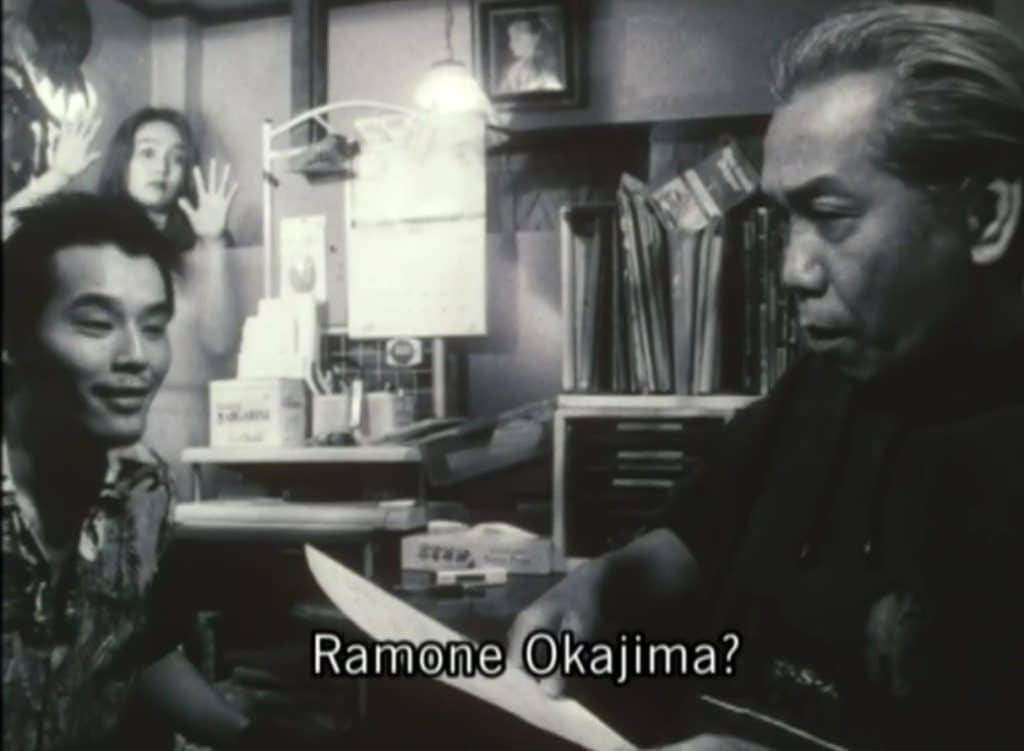
Well, Okajima, the “hero” of the flick calls himself “Ramone Okajima” in one of the substories told, failing to get any part-time job with that name on his resume.
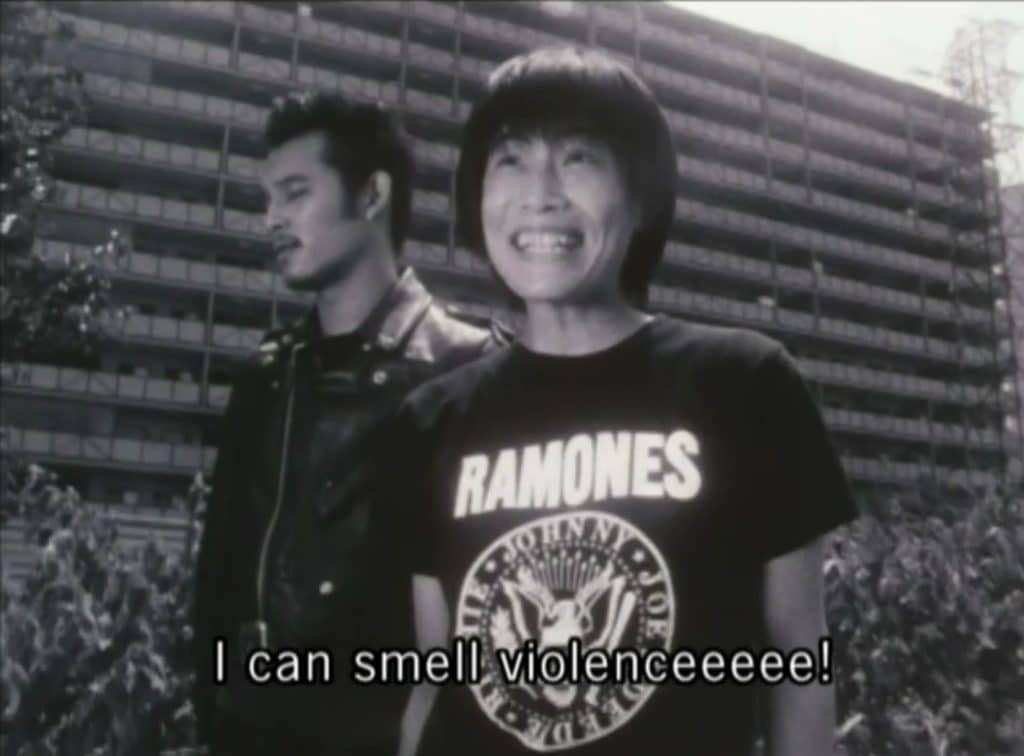
Later in the movie, Haruka reveals her “wedding dress”: a Ramones T-Shirt.
The music played on the soundtrack is all provided by local Osaka outlets, most prominently by comedy-punk band Kokushokuseinen.
There are however endless references made to Western punk bands and American movies, alongside all the references to Japanese manga, anime and all their characters.
It comes off as if director / screen-writer Kakuei Shimada absorbed way too much of all that in the course of his studies and now he finally let it all out.
Despite all the gore and violence throughout the movie, nobody actually ends up seriously injured or dead. It’s a comedy after all.
A comedy that tends to play on the raucous, on the anal, frequently on the scatological.
Here one of the rather innocent jokes… Okajima meets his father. The father being a drug dealer who pretends to be wheelchair-bound but that’s just a ruse.
Okajima hands his father his birthday present – a box of condoms. “Condoms?” the father exclaims, “I should have used those before you were born!”
And then there is Buddha himself in heaven who declares to the earthlings, “I’ve been meditating for 5.8 billion years. Here’s the universal truth.”, handing them a scroll on which it says “Rock’n’Roll”.
The flight from the highrise by the initial punk rocker and Haruka will lead to a similar outcome. Rock’n’Roll heaven or back to earth? In any case, Rock’n’Roll will be the keyword.
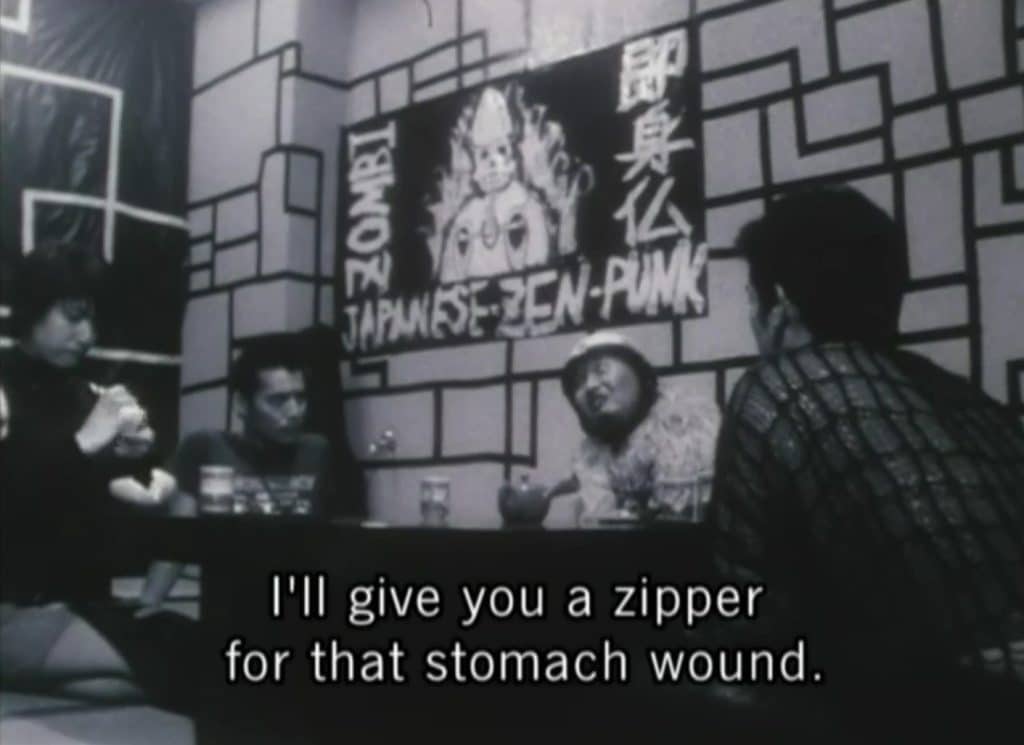
That’s the spirit of the movie. Relentlessly energetic, often silly, at times hardly comprehensible but, hell, it’s all in the spirit of Rock’n’Roll!
Japanese Rock’n’Roll Movies
Blitzkrieg Bop clearly builds on the history of Japanese punk rock movies. Obvious precursors are Sogo Ishii’s Crazy Thunder Road (1980), a wild motorcycle gang romp ending in an epic battle. Ishii followed up on this movie with Burst City (1982), employing a vast array of famous counter-cultural heroes such as singer-song writer Shigeru Izumiya as well as some of the hottest Japanese punk bands of the day, including The Stalin, led by Michiro Endo.
Neither of those films is a comedy but both are extremely energetic, violent and espouse a life on the edge, via rock’n’roll and punk rock.
Wild Zero (1999), a film starring and promoting popular rock band Guitar Wolf, eventually turned the genre towards comedy. The members of Guitar Wolf fighting zombies in a sci-fi setting…
Blitzkrieg Bop picks up from Wild Zero. While Wild Zero had rock stars as heroes, Blitzkrieg Bop had to do with local actors, most of whom appeared only in this movie. Wild Zero had a rather large budget, Blitzkrieg Bop seems to have been filmed with close to no budget at all.
Thus, writer / director Kakuei Shimada had to come up with joke after joke, crazy situation after crazy situation. Did he succeed?
The Osaka movie, music and comedy scene certainly took notice.
Destroy Vicious (Japan, 2011) デストロイ ヴィシャス
For Destroy Vicious, Shimada’s most ambitious follow-up of Blitzkrieg Bop, he was able to employ some serious Japanese movie and music celebrities. More on that soon.
Let’s first get that pesky but necessary plot summary out of the way. Shimada doesn’t care much about coherent plots but he does need a sort of story to hang his bizarre ideas on.
Here we go… the film opens with shots of a laundromat, the walls splattered with blood and an untold number of dead yakuza littering the floor. The two assassins sit next to the corpses, worried. Niimi (played by Masaki Nakai, the main actor of Blitzkrieg Bop) and his fellow assassin played by Marie Decaluco (who played the Torakichi character in Blitzkrieg) look at the mayhem that had created and begin to doubt their action. They wanted to protect their boss from a rival yakuza gang but now they realize that they have gone too far.
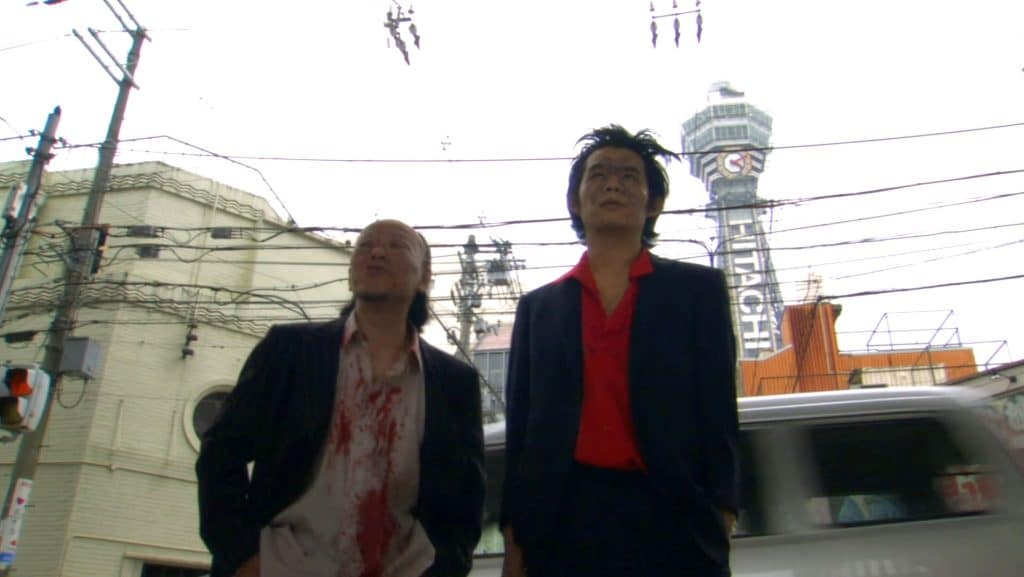
They did indeed go way too far, their own gang boss soon tells them.
That gang boss, known as the Kumicho (gang leader), is played by Akio Otsuka in one of his rare on-screen acting roles. Otsuka is one of the most famous Japanese voice actors, working extensively for anime, in dubbing foreign films and narrating video games. As the Kumicho however, he proves that he also has quite a convincing on-screen personality.
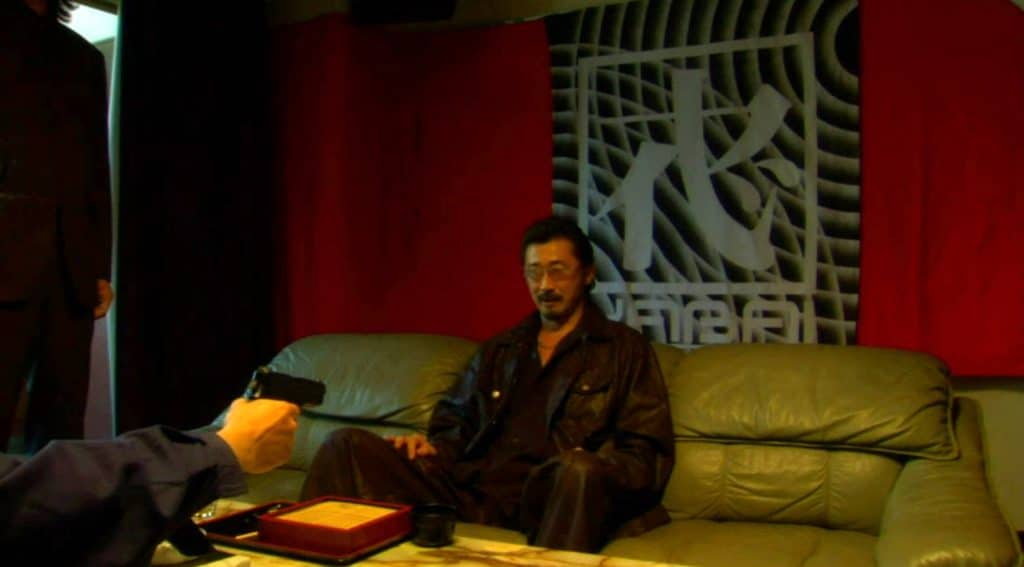
The Kumicho forces Niimi to carve a large X over all his face as punishment for murdering the rival yakuza, then he tells both Niimi and his crazy associate played by Marii Dekaruko to get lost. To stay away from their own gang.
A monster dressed up as a skeleton soon starts to chase the two of them… and the plot stops to make any sense.
Niimi eventually meets a hearing impaired punk rock girl named Maria (played by Sayuki Matsumoto) who sort of takes him in with her family and her girl punk band, the Hinin’s (Inhumans).
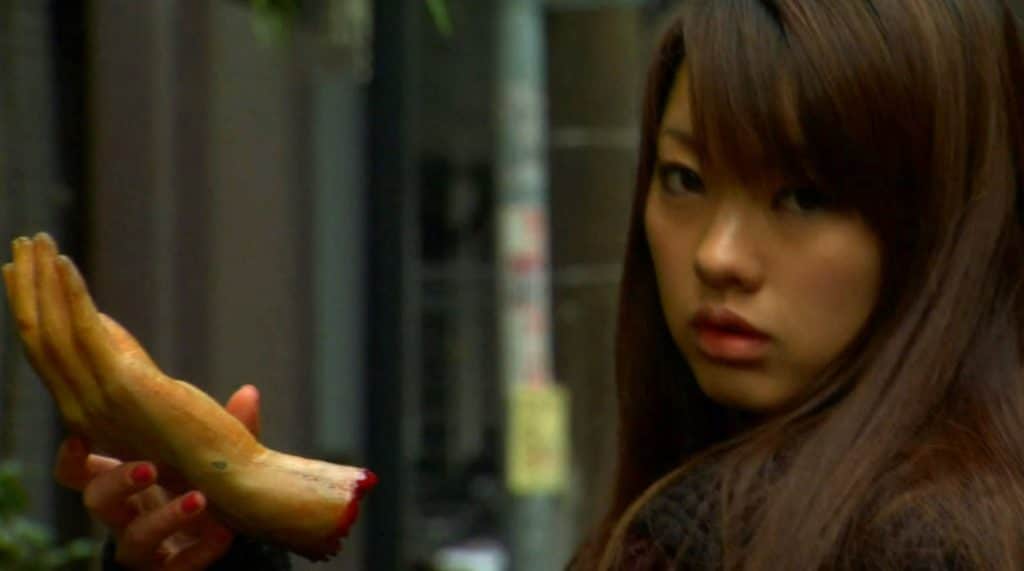
A drone rocket (delivered to the Kumicho by the Chinese embassy and stolen by Niimi) goes off by accident and chops off the heads of dozens of yakuza; Maria’s family house is blown up by a gas explosion (the family nonchalantly eats dinner in the ruins with blackened faces and ripped clothes); in the quieter moments Maria’s mother likes to wear her night gown all day long with her bare breasts sticking out above her camisole.
Add to that an endless array of weird street performers and plenty of violence.
But where is Vicious? He does show up, eventually. A large-scale matsuri is taking place in Nishinari Ward towards the end of the movie, involving all the movie characters. Tsutenkaku Tower comes into sight.
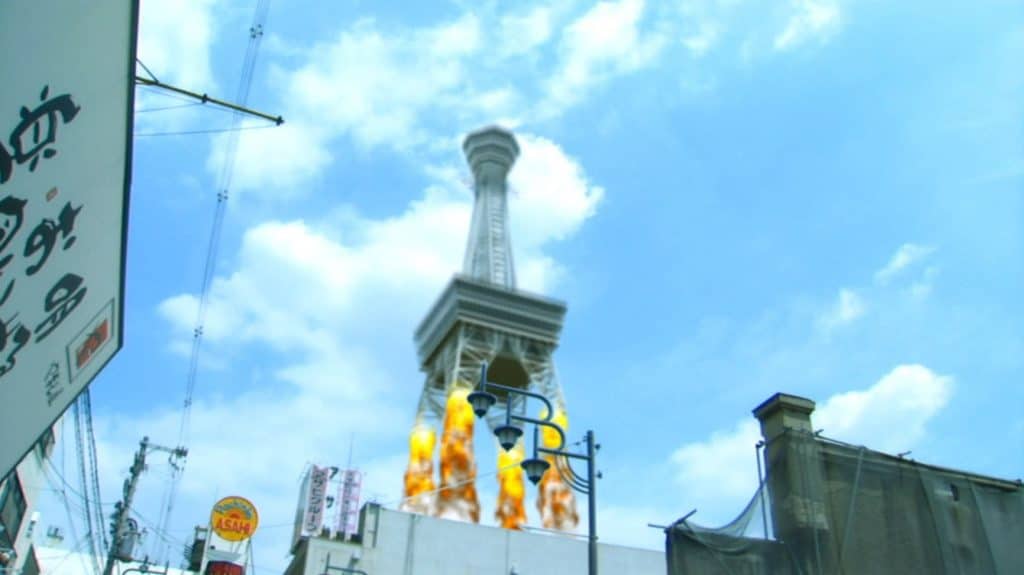
Suddenly, Tsutenkaku Tower lifts up into the air like a rocket, engine fires included. In mid-air, the tower transforms into Sid Vicious, the bass player of the Sex Pistols.
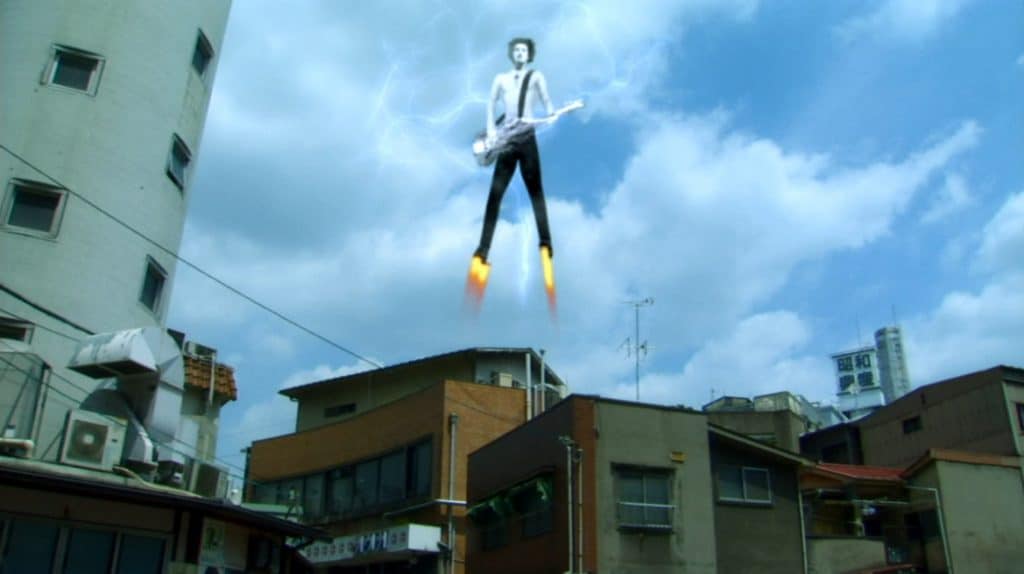
Sid Vicious, high up in the sky and with rocket engine fire at his feet, plays his bass guitar to all of Osaka.
Cameos by Naomi Kawase and Michiro Endo
While Akio Otsuka (who plays the Kumicho) is certainly very famous in Japan, he is famous as voice actor. His face is hardly known.
The face of Naomi Kawase however is known to everyone with even a cursory interest in Japanese cinema. The Nara-based filmmaker and documentarian started her career in her hometown in the early 1990s and is still going strong.
Kawase won numerous prestigious international prizes including Camera D’Or at the Cannes Film Festival in 1997 (winning that prize made her instantly famous in Japan and internationally) as well as the Grand Prix at Cannes Film Festival in 2007, plus a long list of other Japanese and international festival prizes.
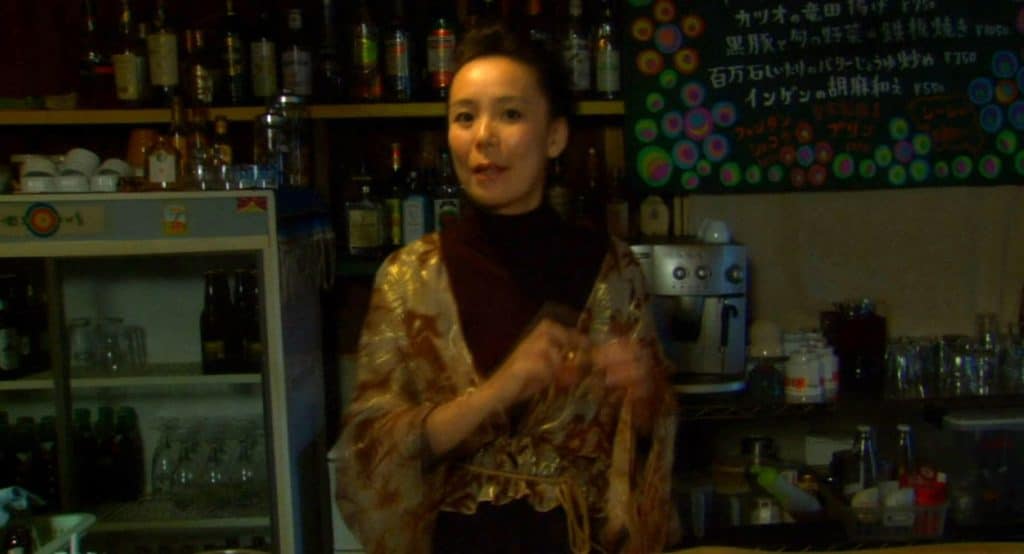
In Destroy Vicious, Naomi Kawase can be seen as bar hostess, conversing with the hearing impaired Maria in sign language.
Legendary punk rocker Michio Endo of The Stalin briefly shows up two times, guitar in hand. The solo tunes he plays at those occasions are however of a rather soft note. Well, soft for Endo standards, anyway.
Kakuei Shimada – the Director
Director Kakuei Shimada was born in Osaka in 1972 and studied at the Osaka Visual Arts Academy. His first film Kazoku Rock (Family Rock), was invited as official entry to the London Raindance Film Festival in 2002.
Blitzkrieg Bop was his second film. Shimada made more than 10 punk rock themed comedies. Today, he is mostly working in Japanese TV.
Osaka Locations
For Shimada as Osaka native, the city seems to be his great playground. Modern housing projects next to river banks, dirty back alleys, small anonymous neighborhood Shinto shrines, that’s the Osaka he presents to the viewer. The Osaka where the residents actually live, not the Osaka of the tourist brochures.
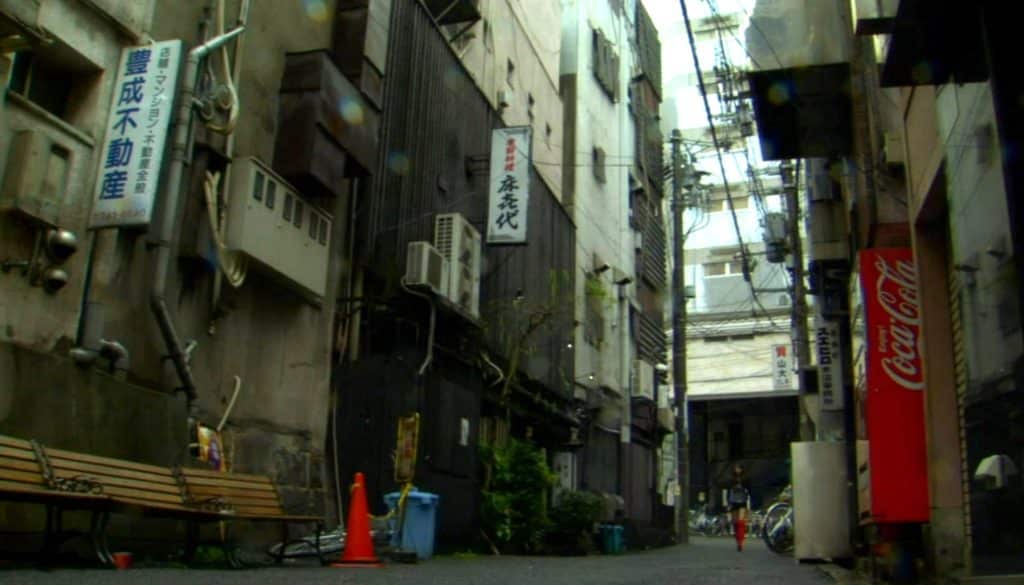
Shimada clearly has a soft spot for Tsutenkaku Tower, though. The tower is prominently featured in both films… it even transforms into the great symbol for rock and punk in Destroy Vicious.
